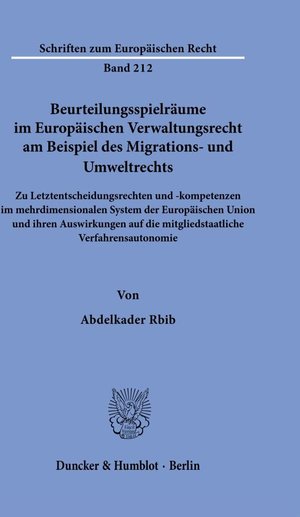
Beurteilungsspielräume im Europäischen Verwaltungsrecht am Beispiel des Migrations- und Umweltrechts.
Zu Letztentscheidungsrechten und -kompetenzen im mehrdimensionalen System der Europäischen Union und ihren Auswirkungen auf die mitgliedstaatliche Verfahrensautonomie.
von Abdelkader RbibBislang bestand nahezu Einigkeit, dass dem Europäischen Verwaltungsrecht die filigrane Differenzierung zwischen Beurteilungsspielraum und Ermessen – die einen Grundpfeiler der deutschen Verwaltungsrechtsdogmatik darstellt und von diesem maßgeblich vorangetrieben wurde – unbekannt ist. Maßgeblich rührt das Verständnis sog. administrativer Letztentscheidungsrechte aus dem frühen Wirtschaftsverwaltungsrecht der 1980er Jahre, welche die Breite heute existierenden Referenzgebiete kaum abdecken kann. Vor diesem Hintergrund stellt die Arbeit eine mögliche Dogmatisierung des bestehenden Verständnisses eines einheitlichen administrativen Letztentscheidungsrechts auf den Prüfstand und macht den Versuch der methodischen Anbindung im mehrdimensionalen System des Europäischen Verwaltungsrechts. Die Untersuchung erfolgt dabei nicht aus der abstrakten Flughöhe einer deutschen Systembildung (»Allgemeiner Teil« und »Besonderer Teil«), sondern aus den konkreten Referenzgebieten des Fachrechts heraus.»The Margin of Appreciation in European Administrative Law based on the Example of Migration and Environmental Law. On Final Decision Powers and Authority in the Multidimensional System of the European Union and their Effects on the Procedural Autonomy of the Member States«: So far, there has been a general understanding that European administrative law is unfamiliar with the fine distinction between the margin of appreciation regarding legal facts and legal implications (so-called administrative final decision powers), which is a central element of German administrative law dogmatics and which has been decisively promoted by the latter. Decisively, this understanding stems from the early economic administrative law of the 1980s, which can hardly cover the scope of today's existing legal frameworks. Against this background, the thesis puts a possible dogmatization of the existing understanding of a standardized administrative final decision power on trial and makes an attempt at a methodical integration in the multidimensional system of European administrative law. The investigation is not carried out from the abstract perspective of the German system (»General Part« and »Special Part«), but rather from the concrete reference areas of the specialized law.






